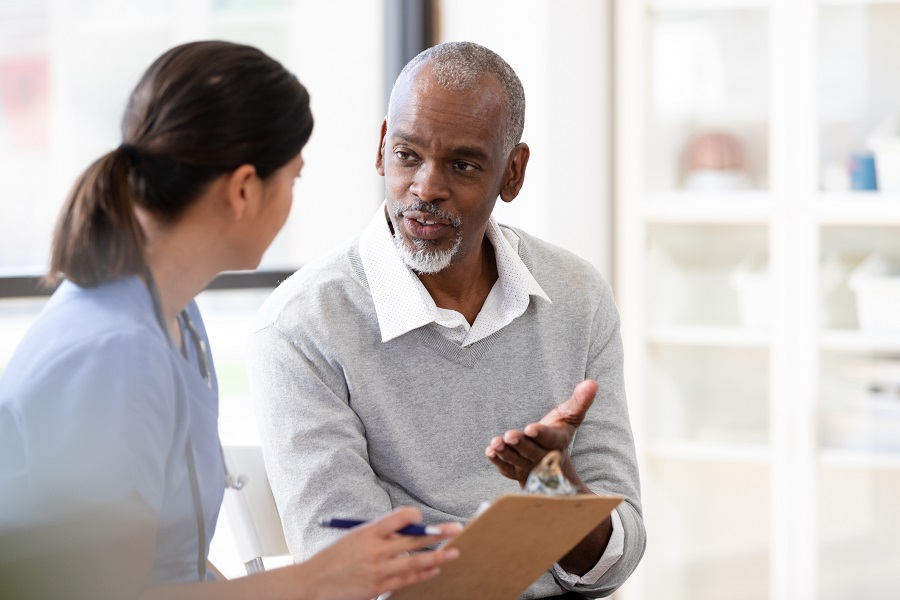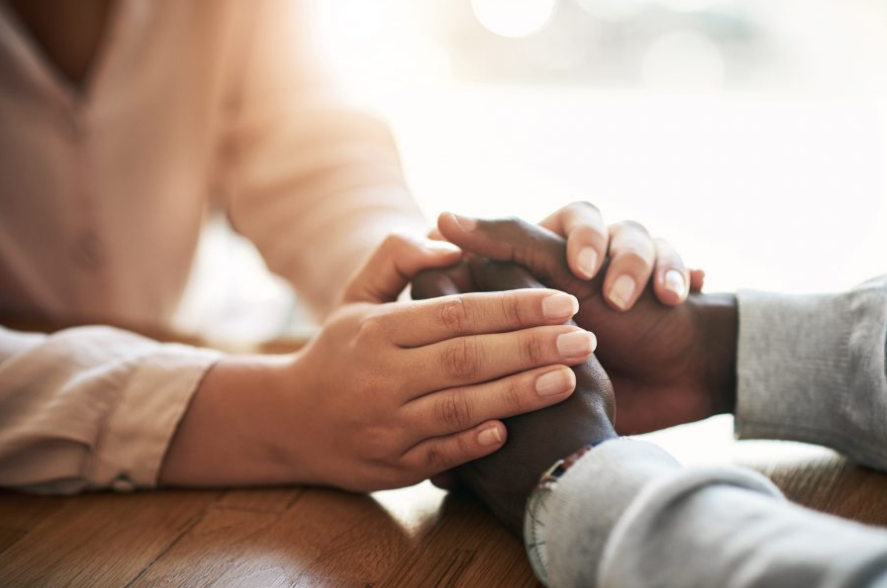Adult Civil Treatment Programs
The Civil Adult Treatment Programs at Central State Hospital provide services to clients over 18 years of age from the Central Virginia area. The services provided range from short term, quick re-entry to the community, to long term intensive treatment for the seriously mentally ill.
These individuals are prescreened by the appropriate CSB, who determine if the person has a mental illness that may lead to serious physical harm to the patient or others, or serious harm due to inability to care for themselves, and there are no less restrictive alternatives that are appropriate to provide the needed care. Civil admissions are involuntary and precipitated by court order. CSH also cares for individuals who have been civilly committed following a determination by the court that they are Unrestorable Incompetent to Stand Trial.
As a part of psychosocial rehabilitation, clients go from their building of residence to the STAR treatment mall each day for group therapy, psychosocial education, and leisure activities.
Adult Maximum Security Treatment Program
Central State Hospital is the only maximum security unit within the DBHDS system, which has been fully accredited by the Joint Commission.
The clients in the Maximum Security Program are provided recovery-oriented psychiatric treatment and evaluation in a safe and secure setting. The Maximum Security facility consists of six treatment and evaluation units, including Admissions, Continuing Care, a Women’s unit, and an Honor’s unit. The treatment model and recovery planning in Maximum Security is consistent with that of the civil units. Other than a perimeter fence for security purposes, the physical environment is comparable to other areas of the hospital and consists of dormitory wings with patient rooms, a large day room area, and recreational patios.
Clients are also able to go from their ward of residence to the Secure Forensic Treatment Mall for group therapy, psychosocial education, and leisure activities.
Legal Codes: What Do They Mean?
Most patients admitted to the Central State Hospital Forensic Unit are admitted from jails or courts by court-order. Each type of court order is authorized by a specific section of the Code of Virginia, and determines the reason for the patient’s admission.
For our full list of Legal Codes, click here!

Models of Care
Recovery-Oriented
Defining mental health recovery is not straightforward. In medicine, if someone has recovered from an illness, it means that they no longer display symptoms, and that the illness has entirely resolved. Some people have applied this to mental health, thinking that recovery means no longer experiencing psychiatric symptoms or that all challenges have been eliminated. At CSH, when we talk about recovery, we don’t mean ‘cured’ or symptom/problem free. Instead, we speak about a personal recovery that is about building a meaningful life, even in the presence of psychiatric symptoms.
We believe in the possibility of recovery for all people. Recovery doesn’t necessarily mean that a person will no longer experience psychiatric symptoms, have struggles, or use mental health services. Instead, it means that the person has taken control of decision-making in their life and can take proactive steps in promoting their wellness. CSH staff support hope and recovery by looking beyond the challenges that may accompany illness to see people for their unique strengths, character, and growth potential.
Trauma-Informed
We strive to deliver behavioral healthcare that is sensitive and responsive to the needs of trauma survivors. Trauma-informed practice means that we recognize and respond to people’s past trauma while making efforts to avoid re-traumatization. We recognize that most individuals under our care have been exposed to traumatic experiences, and understand that even when in the distant past, these events influence a person’s behavior and choices today. As we support people through their recovery process, we focus on safety, empowerment, and connection, with a goal of building and maintaining trust. When indicated, evidence-based services are provided to treat the harmful effects of trauma.
Strengths-Based
Our treatment involves a positive approach that emphasizes and builds on a patient’s best qualities. This contrasts with a deficit-based outlook that focuses solely on problems without consideration of a person’s strengths, resources, and resilience. A strengths-based treatment process can provide an opportunity for people to rediscover themselves as capable people with histories, futures, and interests beyond the symptoms and challenges mental illness may impose. A strengths-based perspective encourages us to recognize that no matter how disabling a mental health condition may be, every person continues to have strengths and capabilities and the ability to learn and develop.

Treatment Planning
Person-centered treatment planning helps put the philosophy of recovery into practice. Each person receiving care at CSH will have an individualized treatment plan created through a person-centered planning process. This type of planning allows the person receiving services to remain at the heart of decisions made about their care. All treatment plans are designed to address the unique needs and goals of the individual. Treatment plans are reviewed frequently and modified as often as needed.
Person-centered treatment planning is an ongoing process of collaboration between an individual and their team members (including family or other supporters) which results in the creation of an action plan to help the person move toward their desired outcomes. Depending on the patient’s needs, clinical treatment team members may include a psychiatrist/nurse practitioner, primary care physician/NP, psychologist, social worker, rehabilitation staff, registered nurse, and psychiatric technician. The treatment team members will individually and collectively assess any mental health challenges a person is facing as well as resources and strengths that may help them. The results of the assessments will be used to create specific goals and objectives that are observable and measurable. Each treatment team member will design, along with the patient, interventions and services aimed at helping the patient achieve the goals and objectives outlined in the treatment plan. Treatment is individualized to each patient and may include stabilization of symptoms through psychopharmacology, management of medical problems, individual or group therapy, psychoeducation and group skills training, recreation therapy, vocational training, and/or peer support. Learn more about our clinical departments below.
Medical Department
Psychiatrists and Nurse Practitioners provide psychiatric services to all patients. In addition to providing leadership to the treatment team, the psychiatric provider completes assessments, makes diagnoses, prescribes medications or other treatments, and reviews the individual’s progress in meeting treatment goals.
Primary care providers are medical staff members who provide physical health screening, assessment, treatment, and referral. Medical staff provide careful medical screening and assessment prior to the admission of any individual to CSH. They perform and document medical evaluations, including medical history and physicals, while medical providers monitor any acute or chronic medical conditions and associated treatment.
Nursing Department
The nursing staff monitor the patient’s status and coordinate treatment interventions 24-7. Nursing staff ensure the environment is safe and therapeutic, providing assistance in areas such as self-care and medication education. The dedicated staff members within the nursing department provide direct care to patients in accordance with each individual’s unique treatment plan. Nursing care is delivered by a staff of registered nurses, licensed practical nurses, and psychiatric technicians.
Psychology and Forensic Services Department
The psychology and forensic services department provides psychological and forensic assessments; multi-modal psychotherapeutic interventions; psychological consultation concerning diagnostic and treatment issues; staff training relevant to psychological theory and practice; behavior consultation; development of psychosocial programming based on sound psychological theory and practice; and contribution to the body of psychological knowledge through relevant research.
Psychological Services
The psychology staff includes Doctoral psychologists, Master’s level clinicians, substance abuse counselors, psychology assistants, practicum students, and predoctoral trainees. A psychology representative is assigned to each multidisciplinary treatment team. Team psychologists complete initial assessments to guide the treatment plan and help clarify diagnosis, in addition to providing therapy services in group and individual modalities.
The psychology department provides services to restore patients to competency, in order to stand trial and complete risk assessments supporting privilege for clients adjudicated Not Guilty by Reason of Insanity. Psychology staff are experts in behavioral interventions, and may help develop individualized behavior management plans or provide behavioral training to other staff when indicated.
Forensic Evaluation Services
Psychologists working in the forensic services division of the hospital provide an array of specialized forensic evaluation services as directed by the courts.
Substance Use Counseling Services
The Substance Use Counselor provides evidence-based and recovery-oriented substance abuse services to patients throughout the campus; completes assessments and screenings to determine the presence and severity of substance use disorders; provides consultation in discharge planning and treatment; and leads groups focused on recovery and relapse prevention.
Social Work Department
A member of the Social Work Department is assigned to each treatment team across campus. Treatment team Social Workers and Discharge Planners at CSH ensure that patients, family members, and other community supports are informed of treatment team meetings, and encourage their input into the planning process. Social Work staff collaborate with the assigned Community Services Board to plan and coordinate the patient’s return to the community or their next residence. The initial Social Work assessment identifies the psychosocial needs and community reentry/discharge barriers, which are shared with the multidisciplinary team to match resources with needs in planning for post-hospital life. Throughout a patient’s admission to CSH, members of the Social Work department will provide treatment planning, family visitation scheduling, case management, individual and group therapy, and discharge planning support. Social Work staff can assist with applying for public benefits (i.e. Medicaid, Social Security), housing, community behavioral healthcare, medical care, and other resources pertinent to an individual’s success in the community.
Psychosocial Rehabilitation Department
The Psychosocial Rehabilitation Department is a multidisciplinary team of creative arts therapists, recreational and occupational therapists, human services, care specialists, pastoral care, administrative supports, and beautician services. As a team, we seek to recognize the uniqueness of each individual in our care and promote self-awareness of their strengths and interests. Our goal is to encourage recovery in the hospital that can continue growing upon return to the community.
All treatment and services provided by professional and technician-level staff are based on an initial assessment completed with the patient during the first week of admission, which identifies pertinent life history, strengths, barriers, abilities, and health needs of the individual patients. Based on these assessment findings, rehabilitation interventions are chosen to assist the patients in meeting their established recovery goals. Day, evening, weekend, and holiday services are provided throughout the hospital.
Treatment or services may include:
Beauty/Barber Shop
Essential hair care services such as haircuts, styling, and some hair treatments are provided to patients across campus. Our barbers/cosmetologists are licensed through the state of Virginia.
Chaplain Services
A qualified chaplain provides individual and group spiritual care, alongside standard church services. Church services are offered on a weekly basis and are open to all patients. The Chaplain offers support during crisis situations, memorial services, and other services as needed.
Human Service Care Specialists (HSCS)
HSCS staff provide healthy leisure services during day, evening, weekend, and holiday hours. They also facilitate active treatment groups, planning evening/weekend activities and special events.
Music Therapy
Music Therapists use music media and activities to accomplish individualized goals within a therapeutic relationship. This modality may facilitate the strengthening of communication skills, expressing feelings and emotions, promoting overall wellness, improving language and speaking skills, managing stress, alleviating pain, reducing anxiety or depression, and regulating mood. Services are provided by a Board-Certified Music Therapist.
Occupational Therapy
Occupational therapists utilize goal-oriented, purposeful activity to assess and treat individuals with psychological, physical, or developmental/intellectual disabilities. These services address the development and maintenance of adaptive skills and performance capacities, which enable the patient to achieve optimal levels of function in activities of daily living, work, self-care, socialization, and leisurely pursuits. The occupational therapist’s functional assessments and treatment methods are concerned with specific performance components which include motor, sensory-integrative, perceptual-cognitive, psychological, and social-interpersonal functions, as well as those environmental factors that inhibit performance. Occupational services/treatment are provided by a Licensed Occupational Therapists and Occupational Therapy Assistants.
Recreational Therapy
Recreational therapy services are designed to restore, remediate, and rehabilitate a person’s functioning and independence in life activities, promote health and wellness, and reduce activity limitations and restrictions. Its goals are to improve functional and adaptive behaviors, increase knowledge of leisure activities and benefits, self-awareness, effective decision-making and communication skills, and increase knowledge of leisure resources accessible in the community. Recreational Therapy services are provided by Certified Therapeutic Recreation Specialists.

Treatment Structure
We believe that every interaction is a therapeutic opportunity. Every staff member is trained to create and sustain a therapeutic environment around the clock. Opportunities for skills coaching and growth occur every day, alongside daily and weekly structured therapeutic activities. Group treatment is offered on the unit and in recovery malls. Individual therapy and other targeted clinical interventions are available when indicated, and include evidence-based approaches like Dialectical Behavior Therapy, Cognitive Behavioral Therapy, and Motivational Interviewing.
CSH provides unique treatment tracks that have been developed to guide programming based on the needs of the individual. Across tracks, treatment is rooted in working toward recovery by building upon each person’s strengths and personal goals. Patients and clinicians work together to identify a unique treatment schedule, with days modeled after a balanced life of active treatment, community involvement, leisure, and self-care activities.
Recovery Mall Programs
CSH offers group programs in recovery-based treatment malls. Schedules are individualized and patient-driven, with most individuals participating in around 15 group hours per week. Groups are diverse in topic, but share a common emphasis on using empirically validated methods to both motivate and teach practical skills. Sessions are led by multidisciplinary staff from all areas of the hospital, including psychology, social work, psychosocial rehabilitation, peer support, and nursing departments.
The Admissions and Acute Care program is focused on psychiatric stabilization, emotion self-regulation, symptom education, mindfulness and relaxation, leisure exploration, therapeutic communication, and effective coping strategy development. Treatment programming for this service line is conducted on the Getting Focused Treatment Mall, where patients have access to an individualized menu of evidence-informed services. Patients with neurocognitive and complex medical needs live on a unit with specialized care, and an environment that includes supports consistent with the patient’s unique needs. Patients may access the Getting Focused Treatment Mall off unit, or on-unit Wellness Programming. Specialized medical care, including assistance with ALDS, is provided as appropriate.
The Promoting Hope Treatment Mall includes active treatment focused on psychoeducation and skills building. The Building Resilience Treatment Mall focuses on advanced programming and intervention. The Adult Maximum Security Treatment Program provides an active treatment mall to patients residing in the secure building. Throughout the campus, Competency Restoration services are provided in group and/or individual formats to those who have been identified as Incompetent to Stand Trial.

